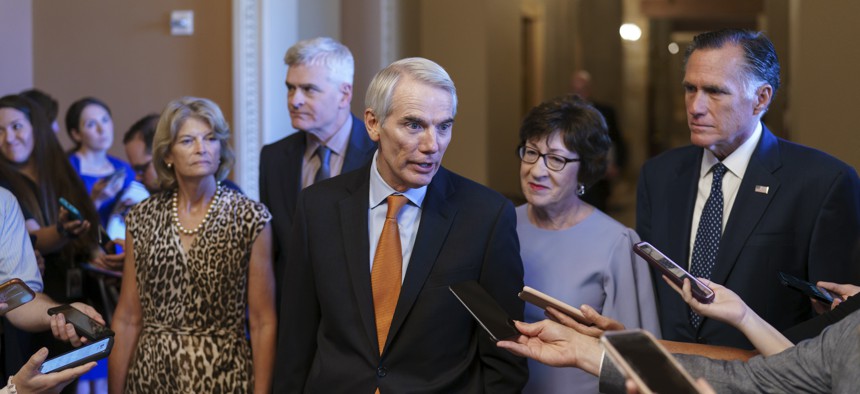Senate Lawmakers Reach Agreement on Infrastructure Package

Sen. Rob Portman, R-Ohio, center, joined by, from left, Sen. Lisa Murkowski, R-Alaska, Sen. Bill Cassidy, R-La., Sen. Susan Collins, R-Maine, and Sen. Mitt Romney, R-Utah, announces to reporters that he and the other GOP negotiators have reached agreement on a $1 trillion infrastructure bill with Democrats. AP Photo/J. Scott Applewhite
The proposal has cleared a key procedural vote, which will allow it to advance.
Update: On Wednesday evening, the Senate cast an initial vote of 67-32 agreeing to take up the package, and setting up the possibility of a final vote on it in the days ahead.
A group of Senate Republicans negotiating a $1 trillion infrastructure package with Democrats said Wednesday they had reached an agreement that resolves major issues in the proposal.
The announcement could set up an initial vote on the package as early as Wednesday evening.
“We now have an agreement on the major issues,” Sen. Rob Portman, the lead Republican negotiator, told reporters on Wednesday. “We are prepared to move forward.”
The bill is expected to cost roughly $1.2 trillion over eight years, with around $550 billion in new spending, but lawmakers were continuing to work out the final details of the package.
Sen. Kyrsten Sinema, the top Democratic negotiator, said lawmakers plan to release some text of the legislation Wednesday and will continue to release other parts as they are finished.
One of the major sticking points for negotiators has been how to pay for the proposal, which will fund highways, transit, broadband, water systems and other public works projects. Finance experts have questioned whether the mishmash of possible funding sources outlined in a White House proposal will be enough to pay for the project.
Portman said the bill is “more than paid for.”
The White House released a statement on the agreement, indicating that new revenues attributable to economic growth because of the investments would help pay for the package. It will also be financed “through a combination of redirecting unspent emergency relief funds, targeted corporate user fees, strengthening tax enforcement when it comes to crypto currencies, and other bipartisan measures,” the statement said.
The package includes $110 billion for roads and bridges, $39 billion for public transit, $65 billion for broadband, $55 billion for water systems, $73 billion for power grid systems, $7.5 billion for a national network of electric vehicle charging stations, according to the White House.
A bipartisan group of lawmakers have been working for weeks to come to an agreement on an infrastructure package.
Local government leaders have urged Congress to approve an infrastructure package, arguing that it will be necessary to help communities recover from the coronavirus pandemic. They’ve also asked Congress not to clawback previous local funding investments to pay for the package.
This week’s announcement comes after Sen. Majority Leader Chuck Schumer tried unsuccessfully to hold a test vote on the proposal last week.
Schumer said Wednesday morning that the Senate should be prepared for a vote as early as today to start debate on the proposal.
“Senators continue to make good progress on both tracks of legislation,” he said.
Sixty votes are necessary to begin debate, meaning that in the evenly split Senate, at least 10 Republicans would have to support the measure.
Andrea Noble is a staff correspondent with Route Fifty.
NEXT STORY: Defending IT infrastructure with analytics





